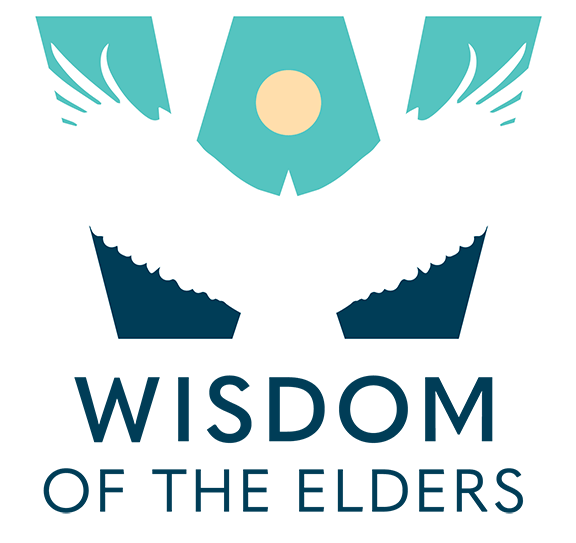The Traveler
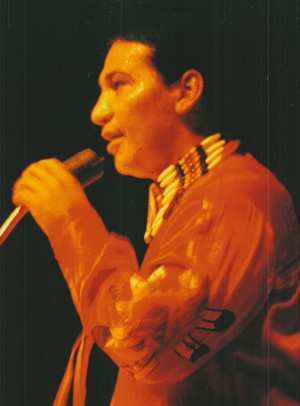 My name is Boye Ladd. I come from the Ho-Chunk Nation, originally from Wisconsin, and I’ve traveled quite a bit throughout the world as a professional dancer. I started dancing when I was about four years old and I’ve been competing since traveling all over the country. Was quite instrumental in the development of a lot of the earlier powwows back in the ’60s. I started actually dancing in 1952 and I’ve seen the evolution of dance, how it’s progressed to what we see today. I was also one of the founders of the World Championship in Connecticut and quite familiar with a lot of the issues that are prevalent in powwow country, Indian country as a whole.
My name is Boye Ladd. I come from the Ho-Chunk Nation, originally from Wisconsin, and I’ve traveled quite a bit throughout the world as a professional dancer. I started dancing when I was about four years old and I’ve been competing since traveling all over the country. Was quite instrumental in the development of a lot of the earlier powwows back in the ’60s. I started actually dancing in 1952 and I’ve seen the evolution of dance, how it’s progressed to what we see today. I was also one of the founders of the World Championship in Connecticut and quite familiar with a lot of the issues that are prevalent in powwow country, Indian country as a whole.
As a traveler, I’ve had quite the opportunity to meet many of the religious leaders throughout the world. I’ve met almost every pope in my lifetime and a lot of the medicine men, a lot of the traditional people in different areas throughout North America. Dance has given me an opportunity to travel to many of these countries throughout the world. I, also as a director, I’ve done many of the dance troupes directing many of the dance troupes overseas, over to Europe and throughout Russia. I’ve been throughout the Soviet Union three times now and have an honor representing the United States, Pan American Airlines, U.S. State Department, various government agencies.
I’ve used dance as a way again to open the doors for me. I’ve met like I said, many people. It’s also given me an education. I’ve paid my finance through university, through school, and everything. I graduated from the Art Institute in New Mexico and I went to the university and had quite an honor of meeting a lot of the big leaders—a lot of the governors, a lot of these people throughout my lifetime.
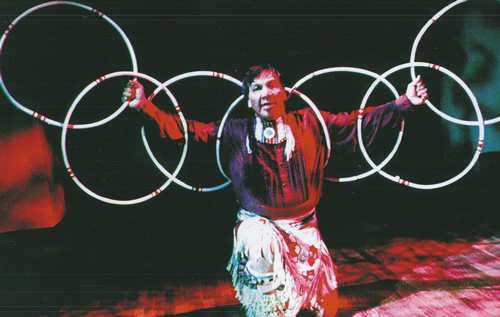 I look at dance as away, as I say, to open many of the doors. I look at tradition, culture as a whole. I used to think that as a Native person that everyone knew the same things that I did. And in much as tradition, I am very fortunate to be raised by my grandparents in the old way. And among the Ho-Chunk people, we still believe in the Medicine Lodge teaching and we’re still functioning with our War Bundle societies, our traditional ways, and quite an honor, very sacred among our people.
I look at dance as away, as I say, to open many of the doors. I look at tradition, culture as a whole. I used to think that as a Native person that everyone knew the same things that I did. And in much as tradition, I am very fortunate to be raised by my grandparents in the old way. And among the Ho-Chunk people, we still believe in the Medicine Lodge teaching and we’re still functioning with our War Bundle societies, our traditional ways, and quite an honor, very sacred among our people.
I sit on various boards traveling a lot and speaking to our veteran groups. It plays a very special place in my heart when we talk about our veterans, our warriors, many of those that didn’t come home as opposed to some of those that did come home, and maybe not necessarily all in one piece. So I try to help them, guide them in many ways according to the teachings of my people.
I have grown to discover that all nations throughout the country, all Indian nations, or some people call tribes, but all nations do have a very special gift, and a very special way that I try to help to heal and some of the ways for our people that don’t understand our tradition, our way of life.
When I come to the communities it’s quite an honor to work with a lot of the elders. I sit down with many of them in discussing, share many of our concerns, share some of the teachings and also get back from a lot of them. A good teacher also learns from the student, so going to these communities it’s, like I say, a good way to open the doors for our people, our culture, and our way of life.
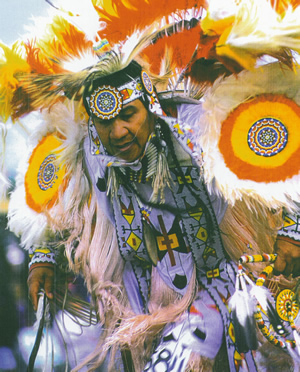 Today in powwow and traditional ceremonies it’s still very much involved in everything that we do. I try to encourage. I try to teach the young people the traditions of our forefathers long ago especially when we talk about rights. They must encompass a human life and be very, very reverent and very respectful.
Today in powwow and traditional ceremonies it’s still very much involved in everything that we do. I try to encourage. I try to teach the young people the traditions of our forefathers long ago especially when we talk about rights. They must encompass a human life and be very, very reverent and very respectful.
I work with feathers and ceremonies trying to help them understand the meaning, the true meaning of what it means to be a warrior, what it means to be traditional, what it means to be a Native American. It’s an approach that I think a lot of our people need to understand.
Working with our traditional people in schools, universities at the local level, elementary, I had the opportunity to work with many young children. I do a lot of storytelling; talking about the who, what, when, and why of, again, our traditions, our way of life. We talk about certain animals, why they have fur. Some have scales. You look at the tails. You look at the spots. And every animal in our, in the native world, does have a story, had, does have a purpose in our way of life and ah, it’s quite unique and very beautiful. You know, and I look at ah, some things that don’t have arms, some that don’t have legs. Well, there’s a purpose and a reason for it.
I use humor as another way to educate many of our people and humor is good medicine. As an emcee, I do emcee a lot of major powwows, arena directs a lot of the major powwows. I tell a lot of stories and I kind of laugh, threaten to tell a lot of the people, saying, “Well you know, we talk about books. We talk about tradition, our way of life.” I try to guide them along those lines, but again still use the element of laughter, a way to heal many of our people. I am somewhat of a comedian a lot of times. You have to be to entertain the people, and especially if you’re an emcee and try to help the people. So again there are numerous, numerous areas that we can speak about in our tradition.
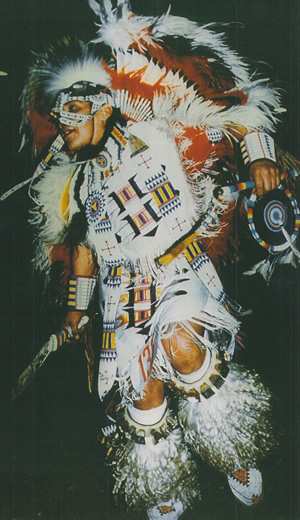 A lot of the shows that I do vary from half an hour to an hour and a half. I am somewhat multitalented, I guess. Hoop dancing calls, Eagle dance, all of the above. I choreographed a lot of the group dances but I also work with the individual dancers. So as a teacher I try to help many of the communities, even a lot of the non-Indians teaching them how to dance, teaching them the traditions. Before one can dance they must learn their culture. They must learn their way of life. So there’s kind of a common parallel, common teaching that has basically evolved from their preliminary stages of origin.
A lot of the shows that I do vary from half an hour to an hour and a half. I am somewhat multitalented, I guess. Hoop dancing calls, Eagle dance, all of the above. I choreographed a lot of the group dances but I also work with the individual dancers. So as a teacher I try to help many of the communities, even a lot of the non-Indians teaching them how to dance, teaching them the traditions. Before one can dance they must learn their culture. They must learn their way of life. So there’s kind of a common parallel, common teaching that has basically evolved from their preliminary stages of origin.
I have taught all levels from the elementary level to the communities to the professional, to the university level to the political levels. I’ve addressed and been a member of all the national organizations, National Congress American Indians, worked with the Native American Rights Fund. I sat on an American Civil Liberties Union board, and as I say, there are numerous, numerous boards I’ve been associated with as well as in Canada. Assembly First Nations, I’ve been working for them for the last fifteen years and am quite familiar with a lot of the legal issues.
I try to help as best I can to many, many, many different areas. I am versed in almost all areas—political, education, spirituality, tradition, ceremony, all of the above. So I hope this will help you anyway. I appreciate the opportunity to come and speak and say a few words anyway, and try to cover some of the things that I address and speak about in many of my lectures. Again, thank you. Aho!
Boye G. Ladd
Box934
Black River Falls, Wisconsin 54615
Cell: (715) 299-5656
Hm: (715) 670-0119
bladd08@charter.net
